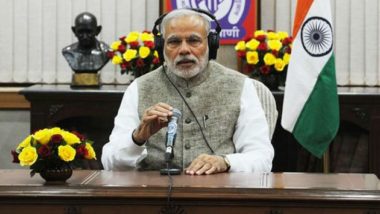New Delhi February 23: Prime Minister Narendra Modi on Sunday narrated stories of courage and strength to convey that 'age and disability' cannot be a hurdle in achieving goals. In his monthly Mann ki Baat radio address, he gave the example of a 105-year old woman who cleared 'level 4' examination in Kerala recently, a 12-year-old girl who scaled Mount Aconcagua in South America and a young man from Uttar Pradesh with physical disability who opened his own slipper manufacturing unit, to drive home his point.
While narrating the story of 105-year-old Bhagirathi Amma, the prime minister said, "If we wish to progress in life, we should develop ourselves, if we wish to achieve something in life, the first pre-condition for that is the student within us must never die." Mann Ki Baat February 23 Highlights: Here's What Prime Minister Narendra Modi Said About Hunar Haat, ISRO's Yuvika Programme, Bio-Jet Fuel's Use by IAF and Much More in 62nd Episode.
He said there are several examples to show how women today are breaking "age-old shackles and attaining new heights". Modi referred to Kamya Karthikeyan (12), who scaled Mount Aconcagua, the highest peak of the Andes Mountains in South America, which is about 7,000 metres high.
Referring to her fitness level, the prime minister said, "A nation that is fit, will always be a nation that is a hit." He also urged people to pick up an adventurous activity and integrate one's life with adventure. "Shouldn't there always be adventure in life?" he said.
Modi also talked about Salman of Moradabad in Uttar Pradesh. Salman, a specially-abled person, set up a slipper manufacturing unit, overcoming odds.
" ... while Salman himself found it difficult to walk, he decided to manufacture slippers which help others to walk easily," the prime minister said.
Salman has also trained 30 persons with disabilities in manufacturing slippers and detergent. Modi said a similar determination has been manifested by residents of Ajrak village in Kutch, Gujarat.
In 2001, after the devastating earthquake, most villagers were migrating from the village. However, one person Ismail Khatri decided to stay back and nurture his traditional art form of 'Ajrak print'. The entire village joined in on their traditional handicraft and fused it with contemporary fashion.













 Quickly
Quickly


